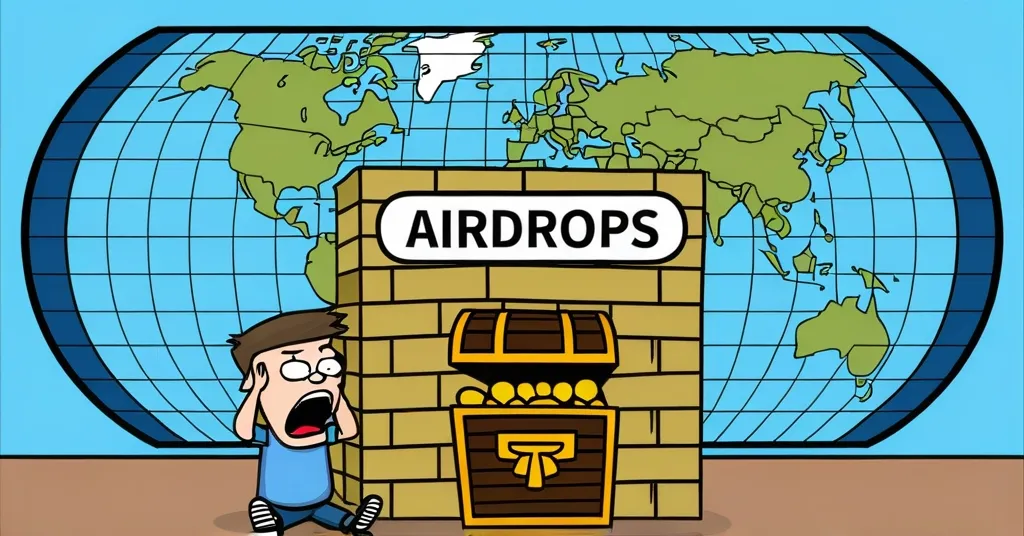U.S. Crypto Users Lose Billions in Airdrops Due to Geoblocking

U.S. Crypto Users Miss Out on Billions in Airdrops Due to Geoblocking
Geoblocking, the practice of restricting access to online content based on a user’s geographic location, has led U.S. crypto enthusiasts to miss out on potential billions in airdrop rewards. An airdrop is when a cryptocurrency project distributes free tokens to users to boost engagement and adoption. This issue marks a significant point of tension between regulatory caution and the dynamic world of decentralized, or peer-to-peer, finance.
- U.S. users missed out on $7.16 billion in airdrops.
- Up to 5.2 million Americans affected.
- Federal tax revenue loss estimated at $418 million to $1.1 billion.
Understanding Geoblocking
Geoblocking refers to the practice of restricting access to online content based on a user’s geographic location. For instance, if you’re in the U.S., you might be blocked from participating in certain crypto airdrops, even if you’re an avid user. Imagine saving up for a new car and then being told you can’t claim a $4,600 reward just because of where you live—that’s the reality for many U.S. crypto enthusiasts.
While some might argue that geoblocking is necessary to comply with regulatory standards, it’s like being invited to a party but being asked to leave as soon as you reach for the gift bag. This exclusion not only frustrates users but also stifles the growth of the crypto ecosystem in the U.S.
The Financial Toll
Dragonfly’s analysis delves into 11 major airdrops since 2020, revealing that these events have been largely inaccessible to up to 5.2 million U.S. users. Projects such as Uniswap, Aave, and SushiSwap aimed to distribute tokens for free, yet U.S. users have potentially missed gains ranging from $1.84 billion to $2.64 billion over the past few years. Moreover, the U.S. federal government is feeling the pinch too, with estimates suggesting a tax revenue shortfall between $418 million and $1.1 billion. This is no small change; it’s a significant blow to an economy that could use every penny.
Some might claim that geoblocking protects users from risky investments, but this argument falls flat when you consider the missed opportunities and the potential tax revenue the government could have collected.
Economic Implications
The impact of geoblocking on U.S. crypto airdrops is significant, leading to missed opportunities for millions of Americans. Further insights from CoinGecko amplify the issue, analyzing 21 blocked airdrops with a potential value of up to $5.02 billion. It’s clear that the impact of geoblocking isn’t just a drop in the ocean; it’s a tidal wave affecting the entire U.S. crypto community.
Jessica Furr, Associate General Counsel at Dragonfly, underscores the gravity of the situation, stating, “The economic repercussions of geoblocking on U.S. users are profound, with significant revenue losses that affect both the individual claimers and the broader economic landscape.”
This issue isn’t isolated. It’s part of a larger narrative where the U.S.’s regulatory uncertainty is driving crypto innovation offshore. Companies like Tether moving to El Salvador highlight the broader economic implications, with potential losses in federal and state taxes amounting to billions.
While some might argue that stricter regulations are necessary to protect consumers, it’s essential to recognize that such measures also come at a cost. The exodus of crypto projects from the U.S. could hinder the country’s ability to lead in the global blockchain revolution.
The Way Forward
The crux of the matter is the tension between regulatory compliance and user access. As the U.S. grapples with how to regulate cryptocurrencies effectively, it’s clear that current approaches are creating more problems than solutions. The exclusion of U.S. users from airdrops not only stifles individual investment opportunities but also hampers the country’s potential to lead in the crypto space.
So, what’s the way forward? As champions of decentralization and freedom at “Let’s Talk, Bitcoin,” we believe that clearer legislative frameworks are essential. Balancing innovation with regulatory oversight is crucial to prevent the alienation of domestic participants and to harness the full potential of blockchain technology. Here’s the kicker: it’s not just about the gains; it’s about building a more inclusive, decentralized financial system. And that’s a revolution worth fighting for.
However, it’s important to consider the potential benefits of stricter regulations. While they might limit access to airdrops, they could also offer better consumer protection and prevent scams that plague the crypto space. It’s a delicate balance that requires thoughtful policy-making to ensure the U.S. remains a hub for blockchain innovation while protecting its users.
Key Questions and Takeaways
- What is the impact of geoblocking on U.S. crypto users?
Geoblocking has resulted in U.S. users missing out on airdrops valued between $1.84 billion and $5.02 billion, affecting up to 5.2 million Americans.
- How much federal tax revenue has been lost due to these restrictions?
The federal government has potentially lost between $418 million and $1.1 billion in tax revenue.
- What is the median payout per wallet address for the analyzed airdrops?
The median payout per wallet address is approximately $4,600.
- Can U.S. users bypass geoblocking to claim airdrops?
Some users may use VPNs to access airdrops, but a significant number of tokens remain unclaimed due to these restrictions.
- What broader economic implications does geoblocking have?
Geoblocking leads to significant revenue losses for both individual users and impacts the broader economic landscape, including federal tax revenue.
As we navigate this complex terrain, one thing is clear: the future of finance hinges on our ability to adapt and innovate. The world of crypto is not just about the gains; it’s about building a more inclusive, decentralized financial system. And that’s a revolution worth fighting for.



